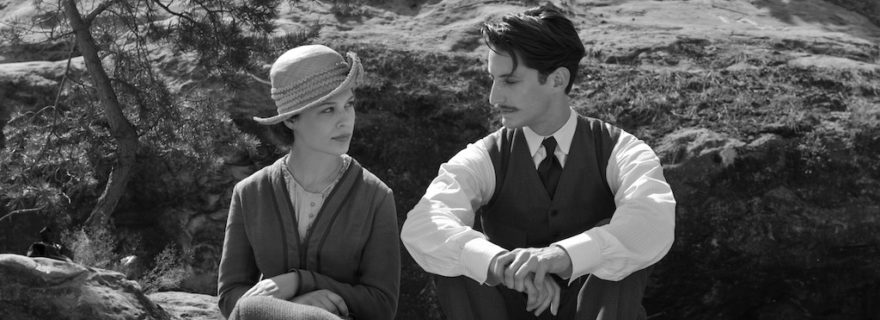'Frantz'
Movie Rating:
3
In a week of dishearteningly empty Hollywood hokum, leave it to the arty leanings of France’s François Ozon (‘8 Women’, ‘Swimming Pool’) to take a classic Hollywood production and nurture it into something more complex. ‘Frantz’ is technically a remake of (or as the end credits claim, “freely inspired by”) Ernest Lubitsch’s 1932 ‘Broken Lullaby’, but quickly matures into a devastating and emotionally fraught exploration of postwar malaise that’s difficult to shake.
German actress Paula Beer stars as Anna, a young woman mourning the death of her fiancée shortly after World War I. She’s lives with her former lover’s parents (Ernst Stötzner and Marie Gruber), perpetually reliving the loss they shared. One day while visiting the departed Frantz’s gravesite, Anna catches the peculiar sight of a man named Adrien (Pierre Niney) laying roses on his grave. At first, they consider the man some sort of threat, but gradually bond with him over shared stories of the two men’s (gently suggested as homoerotic) relationship. Anna slowly becomes obsessed with this new man in her life, fascinated by the love they shared for Frantz. That leads her to follow the mysterious stranger to Paris. Eventually, brutal and uncomfortable truths come to light that push their relationship and the story into something very different than it initially appeared to be.
It would be deeply unfair to reveal anything more about the narrative, which holds many secrets and twists. All that should be discussed is that Ozon’s primary interest in this property lies in an exploration of the nationalist tendencies of France and Germany following the Great War and the spirited xenophobia that caused. Contemporary allegories can be read into the filmmaker’s choice to explore that material now, which is entirely deliberate. The film takes a period-specific story of international distrust and, merely by shoving it in front of contemporary eyes, proves the timelessness of those unfortunate human tendencies. It’s worthy subject matter, just a shame that Ozon’s approach to the material isn’t exactly subtle. The original Lubitsch movie was pretty on-the-nose, and this tale of mutual distrust healed by love and forgiveness might be even more aggressively heavy-handed. (Notice that when you say ‘Frantz’ out loud it can sound like “France”? Yeah, so did Ozon. Prepare for that to be shoved in your face.)
Even so, the film has s a quiet visual beauty that makes it easy to get lost in. The cinematography is stunning, primarily shot in black-and-white with flashes of color when emotionally resonant. Combined with the lush period production design, Ozon’s film can easily seduce audiences into a hypnotic trance. There’s something charmingly old-fashioned about the technical and storytelling construction that will pull viewers along with intrigue, suspense and emotion that’s hard to resist.
Though ‘Frantz’ has been updated from its cinematic influence, its style and impact is rooted in a simpler form of melodrama and suspense. Viewers willing to drop their cynicism can get swept away by the old tricks. Aside from the political relevance of the themes explored, that seems to be Ozon’s primary concern and interest in this material. It’s a sweeping bit of hokum, dressed up with stunning designs, impassioned performances, and images layered with meaning to feel more artistically challenging and contemporary. Undoubtedly, many will read deeply into what the filmmaker intended and pull more out of it than was ever intended. I’m sure that’s fine with Ozon, though. That’s exactly how the brand of classic studio cinema that he’s toying with here was treated at the time. Any less of a response would turn this intriguing little gem into a failure.



